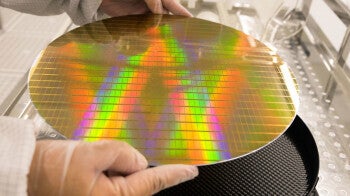President Biden gets a peek at Samsung’s 3nm process node for next-gen chipsets
Samsung Foundry and TSMC are the two top independent chip foundries in the world. They take chip designs created by manufacturers like Apple, Qualcomm, Mediatek, Nvidia, and others and turn them into cutting-edge chipsets used on phones, automobiles, and other devices. Next year, both foundries will be shipping chips produced with the latest 3nm process nodes.
Samsung’s 3nm chips will be up to 35% smaller, as much as 30% more powerful, and will consume up to 50% less energy

A wafer from which cutting-edge chipsets will be diced
Samsung owns 18.3% of the global foundry business compared to TSMC’s 52.1%
According to Trend Force, TSMC had a global market share of 52.1% in the industry during the fourth quarter of last year. Samsung’s market share during the same time period was 18.3%. And looking ahead, Samsung is working on its 2nm process node and hopes to start mass-producing such chips by 2025.
!function(f,b,e,v,n,t,s){if(f.fbq)return;n=f.fbq=function(){n.callMethod?n.callMethod.apply(n,arguments):n.queue.push(arguments)};if(!f._fbq)f._fbq=n;n.push=n;n.loaded=!0;n.version=’2.0′;n.queue=[];t=b.createElement(e);t.async=!0;t.src=v;s=b.getElementsByTagName(e)[0];s.parentNode.insertBefore(t,s)}(window,document,’script’,’https://connect.facebook.net/en_US/fbevents.js’);fbq(‘init’,’950812218873147′);fbq(‘track’,’PageView’);
For all the latest Technology News Click Here
For the latest news and updates, follow us on Google News.
